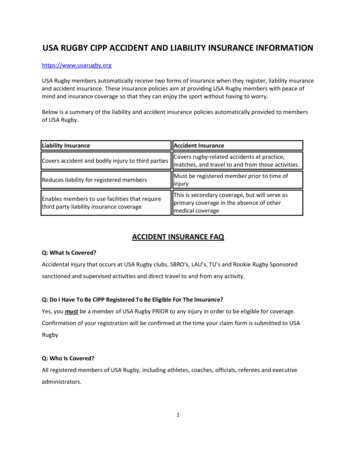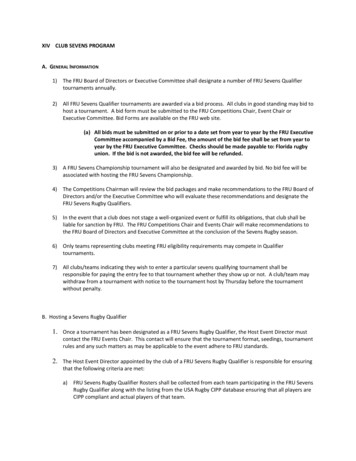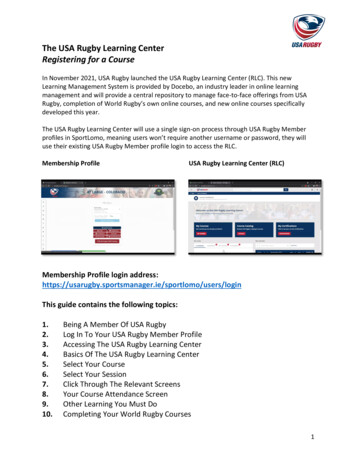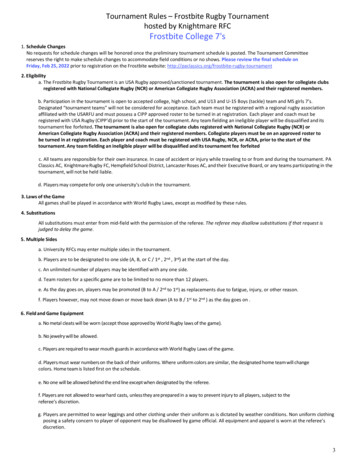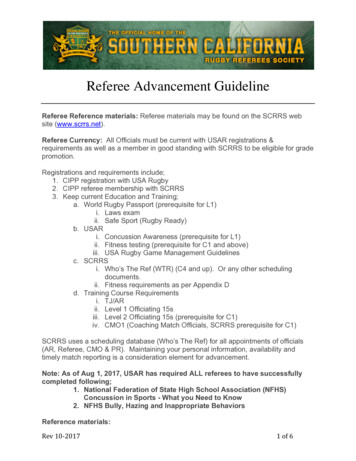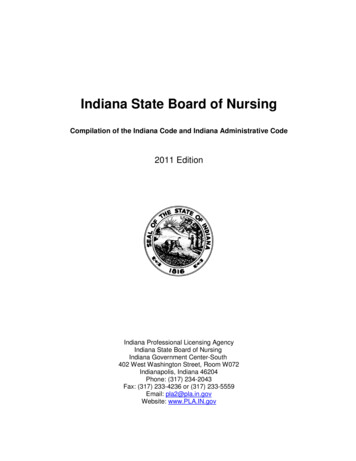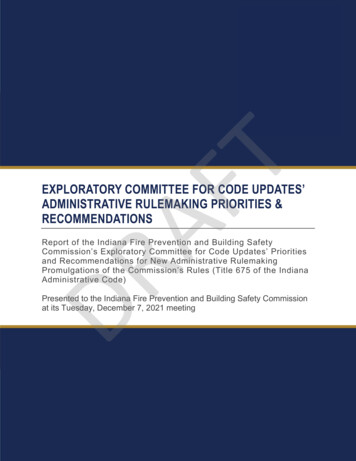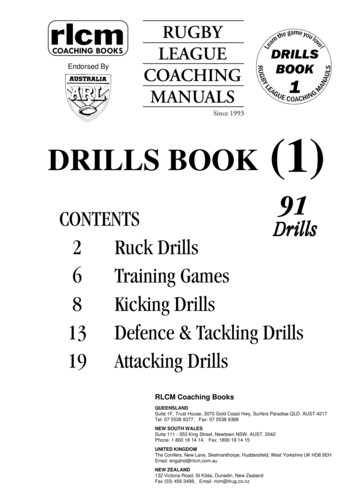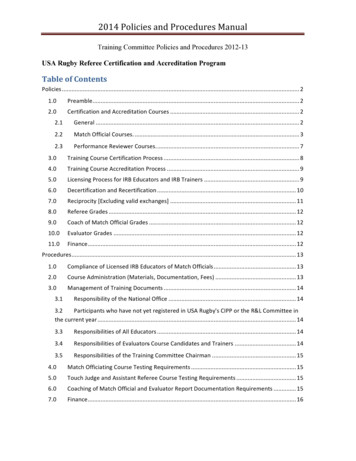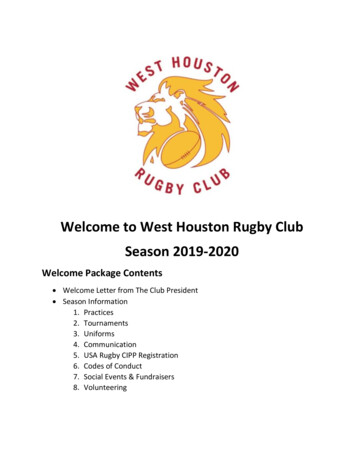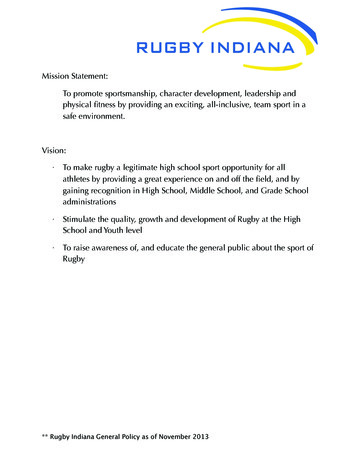
Transcription
Mission Statement:To promote sportsmanship, character development, leadership andphysical fitness by providing an exciting, all-inclusive, team sport in asafe environment.Vision:·To make rugby a legitimate high school sport opportunity for allathletes by providing a great experience on and off the field, and bygaining recognition in High School, Middle School, and Grade Schooladministrations·Stimulate the quality, growth and development of Rugby at the HighSchool and Youth level·To raise awareness of, and educate the general public about the sport ofRugby** Rugby Indiana General Policy as of November 2013
Code of Conduct. 3Parent Pledge . 4Team Eligibility . 5Player Eligibility . 6Season/Schedules . 7Divisions and conferences .7Match Play Guidelines . 8The pitch .8Kit Requirements .9Protest Procedure .9League Championship/tournament rules and regulations . 10Seeding Guidelines .10Rank Calculation .10Championship Round .10Teams pulling out of a competition.11All State .11State Championship MVP .11Select Side Teams . 11Emergency Procedures .12Medical .12Severe Weather.15Alcohol and Drug Policy .16Guidelines For Advertisement. 16Rugby Indiana Disciplinary Procedure . 17General Information .17Scope and Jurisdiction.17Disciplinary Committee.18Yellow / Red Card .20Non-Playing Violations .20Sanctions .21Appeals .22Tracking Offenders .23** Rugby Indiana General Policy as of November 20132
CODE OF CONDUCTUSA Rugby, IYRF and Rugby Indiana expect all teams, coaches, players and parents to abideby the following code of conduct:1. Players who represent their teams are ambassadors of their club, IYRF, Rugby Indiana,and USA Rugby, as well of the game of rugby in general. As such, each player isexpected to be on good, responsible behavior at all times, both on and off the field.2. Players should not exhibit obnoxious, impolite or antisocial behavior (dangerous play)of any sort that would adversely affect the image of the game as a serious anddisciplined endeavor. This includes verbal abuse of opponents by coaches, players,parents or their supporters.3. A player or parent must not before, during or after a match under the jurisdiction of anaffiliated Union or Society threaten or address a referee or touch judge in insultingterms, or act in a provocative manner towards a fellow player, parent, spectator, refereeor touch judge.4. Referees and touch judges must likewise treat coaches, players and parents with equalrespect.5. All players, parents and supporters must respect the ground rules that are in effect atany particular match, such as prohibitions against having alcohol on school groundsand in public parks.6. AT NO TIME WILL ALCOHOL OR DRUGS BE ALLOWED AT ANY HIGH SCHOOLMATCH EITHER BY PLAYERS OR TEAM SUPPORTERS.Violations of this Code of Conduct will be immediately addressed by the Rugby IndianaDisciplinary Committee. All sanctions by the Rugby Indiana Disciplinary Committeewill be enforced by the committee and appropriate coaching staff.Player Name DateTeam / Club player representsSignature** Rugby Indiana General Policy as of November 2013
PARENT PLEDGE1. I will always remember, young people are involved in rugby for their enjoyment,not mine.2. I will always encourage my child to play by the Laws of the Game.3. I will teach my child that doing one’s best is more important than winning, so thatmy child will never feel defeated by the outcome of a game or his/her performance.4. I will set an example for my child by Honoring the Game and will encourage him/her to remember ROOTS—respect for the Rules, Opponents, Officials, Teammates,and Self. If the official makes a "bad" call against my team, I will Honor the Gameand be silent!5. I will praise my child for competing fairly and trying hard, and make my child feellike a winner every time.6. As a spectator, will not engage in any kind of unsportsmanlike conduct with anyofficial, coach, player, or parent such as booing and taunting; refusing to shakehands; or using profane language or gestures.7. I will refrain from coaching my child or other players during games and practices,unless I am one of the official coaches of the team.8. I will refrain from making negative comments about my child's coach in my child'spresence. I understand that this will help to avoid planting negative seeds in mychild's head that can negatively influence my child's motivation and overallexperienceParent Name DatePlayer I Support (printed name)Signature** Rugby Indiana General Policy as of November 20134
TEAM ELIGIBILITY1. All teams must have at least one USA Rugby level 200 certified coach. A certifiedcoach MUST attend ALL practices and ALL matches to ensure the liability insurance isin effect.2. All coaches, assistant coaches, and administrators (having contact with the players)must be registered with USA Rugby and have a level 100 certification.3. Coaches and Assistant Coaches are required to sign the Coaches Code of Conduct.4. All teams/sides shall provide a registered referee to the IRRS pool. Each referee must beavailable to referee at least three matches per season. Teams not in compliance with theabove rule will forfeit the right to play at home until such time as they becomecompliant. A team’s designated referee may become ineligible for the referee pool if he/she does not make him/herself available in the previous season.5.All teams must provide a Certified Touch Judge and they must be available for homegames.6. Numbers required for a second team: Clubs will be required to have a roster of 44 CIPPenrolled players to enter a second side in any division. Clubs will be required to have aroster of 66 CIPP enrolled players to enter a third side in any division.7. Once a multi-school (club) team has reached player numbers of at least 16 studentsfrom at least 2 schools each, Rugby Indiana will begin working with this multi-schoolteam to prepare them to split into two teams. Rugby Indiana will assist in recruitingand training coaches, forming parent organizations, and creating relationships withschool administration. The team should split once they are prepared to do so. Themulti-school team MUST split into two teams once the team has reached playernumbers of 24 students from at least two schools each.8. Rugby Indiana teams are only allowed to play other High School Teams recognized asin good standing with any of the following organizations: RUGBY INDIANA,MIDWEST, USA Rugby, or IRB. (No College or adult sides allowed for safety andliability reasons).9. There will not be any mixed gender high school teams allowed to compete in any highschool match in Indiana.10.CONTINGENCIES: The IYRF Executive Director (ED) reserves the right to add newteams and to adjust divisions and these regulations, as it may become necessary.** Rugby Indiana General Policy as of November 2013
PLAYER ELIGIBILITYHigh School, Midwest, All-Star1. All players must be registered with Rugby Indiana and have a CIPP registration withUSA Rugby before they are eligible to practice or play.2. Age requirement:a. Players are eligible if they have not reached their nineteenth birthday by theSeptember 1st that occurs at the start of the competitive season.b. U15 players should not normally play High School rugby. U15 players who wish toplay in or be involved in training for high school rugby must obtain a USAR waiverto play.3. Players must be enrolled in high school or enrolled in a GED program.a. Players graduating midterm are eligible for the spring season as long as they arenot enrolled in college.b. Home school players are eligible as long as they meet the age requirements andare not enrolled in college.c. If the competition season extends beyond the end of school year, then theplayers may continue to participate in the competition provided that the playerswere otherwise eligible at the end of the school year.4. Players must play for their High School team or community team. If no high schoolteam exists, players are permitted to join another nearby team. Any player wishing toregister to play with a club other than their home club must submit a request in writing,stating their reason for that request to the Executive Director. The Executive Directormay approve such requests only under exceptional circumstances. Carefulconsideration will be given to both the player and the effect his/her leaving would haveon the home club.5. Player must provide current school identification upon request to opposing coach and/or referee. Player will not be eligible for play if identification cannot be produced.6. Players must participate in a minimum four practices, with coached supervisedtackling, prior to any match they will play in.7. Player must meet and remain in compliance with all applicable amateur standards.If a club plays a player that is not CIPP registered then the club must forfeit that matchand will be subject to additional punishment.** Rugby Indiana General Policy as of November 20136
SEASON / SCHEDULES1. RUGBY INDIANA’s competitive league season runs from April through June.2. RUGBY INDIANA’s Select Side season runs from June through July.3. RUGBY INDIANA’s non-competitive club season runs from September through October.4. League schedules are developed and maintained by RUGBY INDIANA.5. All schedule changes apart from those caused by severe weather made less than 10 daysprior to a game will be at the discretion of the Executive Director.6. All games cancelled due to weather or other extenuating circumstance will be rescheduled for the Monday following the cancelation.DIVISIONS AND CONFERENCESRugby Indiana will have the following divisions and conferences: High School Boys Super League‣ Varsity‣ Junior VarsityHigh School Boys DI‣ Varsity North conference South conference‣ Junior Varsity North conference South conferenceHigh School Boys DII‣North conference‣South conferenceHigh School Boys DEVHigh School Girls DIHigh School Girls DIIYouth‣7/8 Grade Boys Tackle Conference‣7/8 Grade Girls Tackle Conference‣5/6 Grade Co-ed Tackle Conference‣2/3/4 Grade Co-ed Non-Contact Conference** Rugby Indiana General Policy as of November 2013
MATCH PLAY GUIDELINESRUGBY INDIANA follows all the laws and rules of the game as stipulated by the IRB andby USA Rugby unless otherwise stipulated in this handbook. You may view them at: HE PITCH1. Before any player steps on the pitch, the coach must have in their possession thefollowing forms:a.b.c.d.e.f.Liability / consent to treat form Waiver (Appendix A)Player RosterMaster Player RosterFacility Specific Emergency Action Plan (Appendix D)Injury Incident Report (Appendix E)Signed acknowlegdment of receipt of Concussion risks and fact sheet(included in Waiver) (Appendix A)2. Matches must be played on adequately sized fields (see chart below).3. Prior to the start of the game, coaches and referees must check athletic grounds forhazards (rocks, holes, water, etc.). Also consider current and potential weatherconditions (e.g. lightning).4. All teams will provide the opposition with a roster of their 23 players before each gameonly players listed on that roster shall be eligible to play in that game (Appendix G)5. Players and coaches need to be on separate sidelines when venues allow it. Whenvenues don’t allow, the teams will remain on separate halves of the pitch with a dividerto determine the middle.6. All pitches must be properly lined, flags posted, goal posts padded and have crowdrestraints on both sides of the field.7. Rugby Indiana matches will follow USA Rugby’s guidelines in regards to matchduration:** Rugby Indiana General Policy as of November 20138
KIT REQUIREMENTS1. Proper equipment is required for all matches.2. Mouth guard is required.3. Rugby boot or soccer/football cleats with plastic “Spike” is acceptable.4. Scrum head gear, mittens, and shoulder pads must have the IRB approval stamp.5. Women may wear chest pads which bear the iRB approval mark.6. Jewelry must be removed.7. Kits must match and be clean with no tears in shirts, shorts, and socks. Short, or cut,sleeves must be hemmed and must at least cover the player’s biceps. No clothing mayshow below Rugby shorts (no boxer shorts); except for spandex shorts.8. Numbers on jerseys are mandatory.9. Clubs cannot have any reference to alcohol or tobacco related products or companiesdisplayed on any part of their kit.PROTEST PROCEDUREThe Team Captain must advise the Referee BEFORE KICKOFF that their team wishes toregister a protest and give the reason. The Referee must notify the opposing Team Captainthat the game is going to be played "under protest" and for what reason. The Referee shouldgive the offending team a reasonable amount of time to correct the circumstances of theprotest. If the circumstances are not corrected, the Referee and protesting team MUSTnotify the ED, in writing, within 72 hours of the circumstances of the protest. The ED willreview the protest and the teams involved will be notified of the decision** Rugby Indiana General Policy as of November 2013
LEAGUE CHAMPIONSHIP TOURNAMENT RULES & REGULATIONSSEEDING GUIDELINESBoys High School Super League: Varsity and Junior Varsity rank will be calculated forseeding into the two state championship brackets.Boys High School DI: Varsity and Junior Varsity will be split into two conferences (Northand South), rank will be calculated for seeding into the two state championship brackets.Boys High School DII: will be split into two conferences (North, South) and rank will becalculated for seeding into the state championship brackets.Girls High School DI: rank will be calculated for seeding into the state championshipbrackets.Girls High School DII: Girls coaches will meet by May 1 to determine the viability of aGirls HS DII state championship.Youth: rank will be calculated for seeding into the state championship brackets.** See Appendix I for State Championship bracketsRANK CALCULATIONS/ STANDINGS1.There is no sudden death in league play. Ties are entered into the standings and eachteam is awarded appropriate points.2. Forfeits will be recorded as a 24-0 score. If forfeit is requested less than 48 hours priorto match, the offending team will not be allowed to host a home championship gameand will be required to pay referee fee.Division points will be awarded as follows:·4 points will be awarded for a win·2 points will be awarded for a draw·1 point will be awarded to a team that loses a match by 7 points or fewer·1 point will be awarded to a team scoring 4 tries or more in a matchIn the case of teams with equal league points, the tie will be broken by head-to-headresults, then by points allowed.** Rugby Indiana General Policy as of November 201310
CHAMPIONSHIP ROUND RULESPeriods will be 30 minutes per half unless a team is scheduled to play two matches in asingle day where the time will be 22.5 minutes per half. There would be no ties. If thescore is tied, there will be an additional 10 minute sudden death period. If tied at the endof the sudden death, the game will be decided on kicks: The coach will select five playerswho were on the pitch at the end of the sudden death period to take turns kicking [drop orplace kick] at goal from the center 22 meter mark, the team who makes the most kicks isthe winner. [each kick worth 1 point]TEAMS PULLING OUT OF A COMPETITIONAny team that withdraws after the start of any competition will be assessed a 250 fine andwill be ineligible for play at that level for next season.ACADEMIC ALL STATE SELECTIONSPlayer Eligibility Junior and Senior male and female players from teams that are in good standingwith Rugby Indiana Must consistently contribute at the varsity or “A” team for their respective team/clubAcademic Requirements Junioro 3.2 Cumulative GPA (end of semester)o 1600 SAT out of 2400 or 25 ACT Senioro 3.4 Cumulative GPA (end of semester)o 1700 SAT out of 2400 or 27 ACTProcessApplications must be filled out by the team/club coach and submitted with copy ofstudent’s most recent transcripts to the Executive Director of Rugby Indiana. Applicationswill be processed twice a year. Seniors should submit their applications in the first cycle asthe first Academic All-State roster will be published by second Monday in January (beforemost college application deadlines). The second (augmented) roster will be published afterthe end of the school year (end of June). (First consideration) application deadline is the first Monday in January. AcademicAll-State team honorees will be posted the second Monday in January. (Second consideration) application deadline is the second Monday in June.Academic All-State team honorees will be posted the last Monday in June.ALL STATE SELECTIONSThere will be a Boys High School DI, DII; and Girls High School DI, DII All State teamselected. The All-State selections will be a team-chosen honor, with each team getting 2** Rugby Indiana General Policy as of November 2013
votes, the final four teams in the state championship getting 3 per club, and the statechampions getting 4. All teams must provide their “2 vote” player selections to theexecutive director one week prior to the State Championship game. The remaining votesare due as soon as possible but no later than the day of the State Final.STATE CHAMPIONSHIP MVPsThere will be a Boys High School DI, Boys DII, Girls High School DI and a Girls DII MVP.The MVP’s shall be chosen by the Indiana Select team coaches at the state championshipfinals.SELECT SIDE TEAMSAll Rugby Indiana players will be eligible to try out for Indiana select side play. RugbyIndiana has Boys and Girls U19 and U17 teams; There are boys teams in both the north &south regions. All players are strongly encouraged to attend try outs as most players inIndiana are retained (thus the need for multiple teams). Regional select tryout dates andlocations will be announced by the select side head coaches and posted on thewww.rugbyindiana.com website.Coaches interested in the Select Side head coach position should review roles andresponsibilities and submit a resume to the Executive Director.EMERGENCY PROCEDURE GUIDELINESMEDICAL GUIDELINESEach program needs an established emergency plan unique to each place of assembly. Theaction plan includes naming the individual trained to assess the situation, 911 involvementprotocol, parental contact responsibility, directions/contact information for the nearesthospital, and notation of a volunteer responsible for accompanying the injured athlete tothe hospital. A detailed emergency action plan should be drafted prior to any activity,reviewed by all medical staff and made available on-site as a reference.1.Team coaches and administrators should familiarize themselves with the USA RugbyMedical and Safety Guide on their website: http://www.usarugby.org/#goto/Medical Safety2. It is required that each club will develop and maintain an Emergency Medical Plan foreach practice/game site which is to be made available to visiting teams at least 24 hoursin advance of a match. (Appendix D)a.Should an injured player require more treatment than can be provided by on-site** Rugby Indiana General Policy as of November 201312
trainers or professionals, transport to the nearest emergency facility will benecessary. Under these circumstances, it is important to provide clear writtendirections to the nearest Emergency Room. Emergency phone numbers forprofessional medical transport companies should be a part of the EmergencyMedical Plan with a copy available in the medical kit.b. Coaches and Administrators should ensure that their players are familiar with theEmergency Medical Plan in the event that the coach is in need of medical attention.c.Each team will have a cell phone available during the game.d. Coaches will have the players’ emergency contact, insurance information, consentto treat, and waiver release available.3. Rugby Indiana recommends that each home team have a Certified Athletic Trainer(ATC), Medical Doctor (MD), or other medically qualified individual (ideally anappointed Medical Director) to cover the match. A coach may fulfill this requirement aslong as he is able to immediately pass his coaching responsibilities to another coachand assume the Medical priority.4. All coaches will fill out an “Injury Incident Report” and submit it to the Executive Directorwithin 48 hours for any reportable injury. (Appendix E)SIGNS OBSERVED BY COACHING STAFFSYMPTOMS REPORTED BY ATHLETEAppears dazed or stunnedHeadache or “pressure” in headIs confused about assignment or positionNausea or vomitingForgets an instructionSIGNS OBSERVED BY COACHING STAFFBalance problems or dizzinessAppears dazed or stunnedSYMPTOMS REPORTED BY ATHLETEIs unsure of game, score, or opponent Headache or “pressure” Doublein head or blurry visionNausea or vomitingMoves clumsilySensitivity to lightBalance problems or dizzinessDouble or blurry visionSensitivity to lightAnswers questions slowlySensitivity to noiseLoses consciousness (even briefly)Feeling sluggish, hazy, foggy, or groggyShows mood, behavior, or personality changesConcentration or memory problemsCan’t recall events prior to hit or fallConfusionCan’t recall events after hit or fallJust not “feeling right” or is “feeling down”** Rugby Indiana General Policy as of November 2013
a) Definitions of a “Reportable Injury”: any incident that caused cessation ofcustomary participation in the current session or the day following the injury onset.Dental or fracture injuries should be automatically reported, even if noparticipation time is lost.b) For head injuries, the definition of reportable Injury is: A head injury for which theinjured player was removed from participation AND evaluated for a traumatic brainor head injury by an athletic trainer, physician or both prior to returning toparticipation.HEAD AND NECK INJURIESSevere injuries to players from programs who safely address the risk factors of the sport arerare. Everyone involved should learn to recognize the signs and symptoms of players whohave suffered a concussion and how best to treat the condition.From the CDC Website www.cdc.gov/concussion/index :About ConcussionA concussion is a type of traumatic brain injury (TBI) caused by a bump, blow, or jolt to thehead. Concussions can also occur from a fall or a blow to the body that causes the headand brain to move quickly back and forth. Doctors may describe a concussion as a “mild”brain injury because concussions are usually not life-threatening. Even so, their effects canbe serious.Concussion Signs and SymptomsAthletes who experience one or more of the signs and symptoms listed above after a bump,blow, or jolt to the head or body should be kept out of play the day of the injury and until ahealth care professional, experienced in evaluating for concussion, says they are symptomfree and it’s OK to return to play.Getting BetterRest is very important after a concussion because it helps the brain to heal. Ignoring yoursymptoms and trying to “tough it out” often makes symptoms worse. Be patient becausehealing takes time. Only when your symptoms have reduced significantly, in consultationwith your doctor, should you slowly and gradually return to your daily activities, such aswork or school. If your symptoms come back or you get new symptoms as you becomemore active, this is a sign that you are pushing yourself too hard. Stop these activities andtake more time to rest and recover. As the days go by, you can expect to gradually feelbetter.“Heads Up” on ConcussionCDC has created two free online courses – one for health care professionals and anotherfor youth and high school sports coaches, parents, athletes – that provide importantinformation on preventing, recognizing, and responding to a /HeadsUpConcussion.html** Rugby Indiana General Policy as of November 201314
RUGBY INDIANA PROTOCOL FOR IMPLEMENTATION OF NATIONAL FEDERATIONOF STATE HIGH SCHOOL ASSOCIATIONS (NFHS) SPORTS PLAYING RULES FORCONCUSSIONS“Any athlete who exhibits signs, symptoms, or behaviors consistent with a concussion(such as loss of consciousness, headache, dizziness, confusion, or balance problems) shallbe immediately removed from the contest and shall not return to play until cleared by anappropriate health care professional.”The language above, which will appear in all National Federation sports rule books for the2011-12 school year, reflects a strengthening of rules regarding the safety of athletessuspected of having a concussion. During the 2009-10 school year, some rules codesrequired officials to remove from play any athlete who was “unconscious or apparentlyunconscious.” This new language reflects an increasing focus on safety, given that the vastmajority of concussions do not involve a loss of consciousness. This protocol is intended toprovide the technicalities to follow during the course of contests when an athlete sustainsan apparent concussion.1. The Official’s Role in Recognizing a Concussive Event: If an official observes a playerthat is exhibiting concussive signs, including appearing dazed, stunned, confused,disoriented, to have memory loss, or the athlete is either unconscious or apparentlyunconscious, he/she shall notify a coach that a player is apparently injured and advisethat the player should be examined by a health care provider.2. If it is confirmed during the contest by the school’s designated health care professionalthat the student did not sustain a concussion, the head coach may so advise the officialsduring an appropriate stoppage of play and the athlete may reenter competitionpursuant to the contest rules.In the event the contest continues and the designated health care professional does NOTclear the athlete for return during said contest the athlete is subject to the return to playprotocol as listed below:a) Only an MD or DO may clear the individual to return to competition.b) The clearance must be in writing.c) The clearance may not be on the same date on which the athlete was removedfrom play.4. In cases where a designated tournament physician (MD/DO) is present, his or herdecision to forbid an athlete to return to competition may not be overruled.The designated health care professional may be one of the following individuals: A medical doctor (MD) or doctor of osteopathic medicine (DO) that holds anunlimited license to practice medicine in the state of Indiana, or; A certified athletic trainer (ATC/L) licensed in the state of Indiana.Return to Play ProceduresWhilst the guidelines apply to all age groups particular care needs to be taken withchildren and adolescents due to the potential dangers associated with concussion in the** Rugby Indiana General Policy as of November 2013
developing brain. Children under ten years of age may display different concussionsymptoms and should be assessed by a Medical Practitioner using diagnostic tools. As foradults, children (under 10 years) and adolescents (10 – 18 years) with suspectedconcussion MUST be referred to a Medical Practitioner immediately. Additionally, theymay need specialist medical assessment. The Medical Practitioner responsible for thechild’s or adolescent’s treatment will advise on the return to play process, however, a moreconservative GRTP approach is recommended. It is appropriate to extend the amount oftime of asymptomatic rest and /or the length of the graded exertion in children andadolescents.Children and adolescents must not return to play without clearance from a MedicalPractitioner. Please see Appendix K for the CDC player concussion fact sheetPlease see Appendix L for the CDC parent concussion fact sheetPlease see Appendix M for the Rugby Indiana concussion Return to Play FormPlease see Appendix N for the complete iRB Return to Play GuidelinesSEVERE WEATHER GUIDELINES1. SEVERE STORM: If a severe storm approaches the playing area, the safety of theplayers is the number one priority of coaches and referees and may require that thegame be suspended while shelter is sought. In the event the game is suspended due toa severe storm ALL participants MUST clear the field immediately and move into apermanent shelter.2. LIGHTNING: If lightning is within 5 miles, the game(s) should be suspended andshelter sought. A lightning detector can identify the distance accurately but may not beavailable. A simple r
1. All players must be registered with Rugby Indiana and have a CIPP registration with USA Rugby before they are eligible to practice or play. 2. Age requirement: a. Players are eligible if they have not reached their nineteenth birthday by the September 1st that occurs at the start of the competitive season. b.

